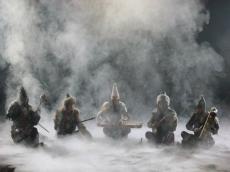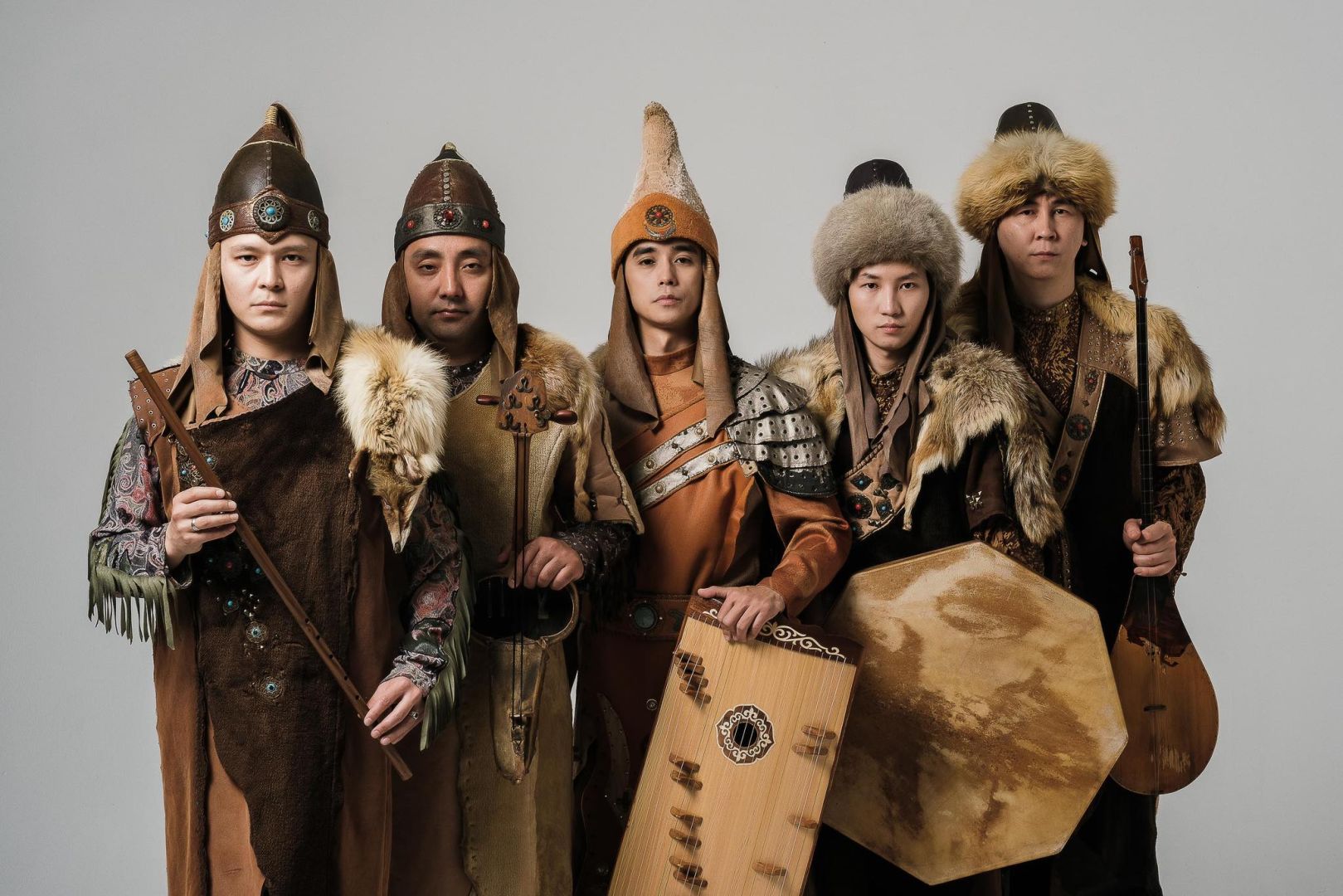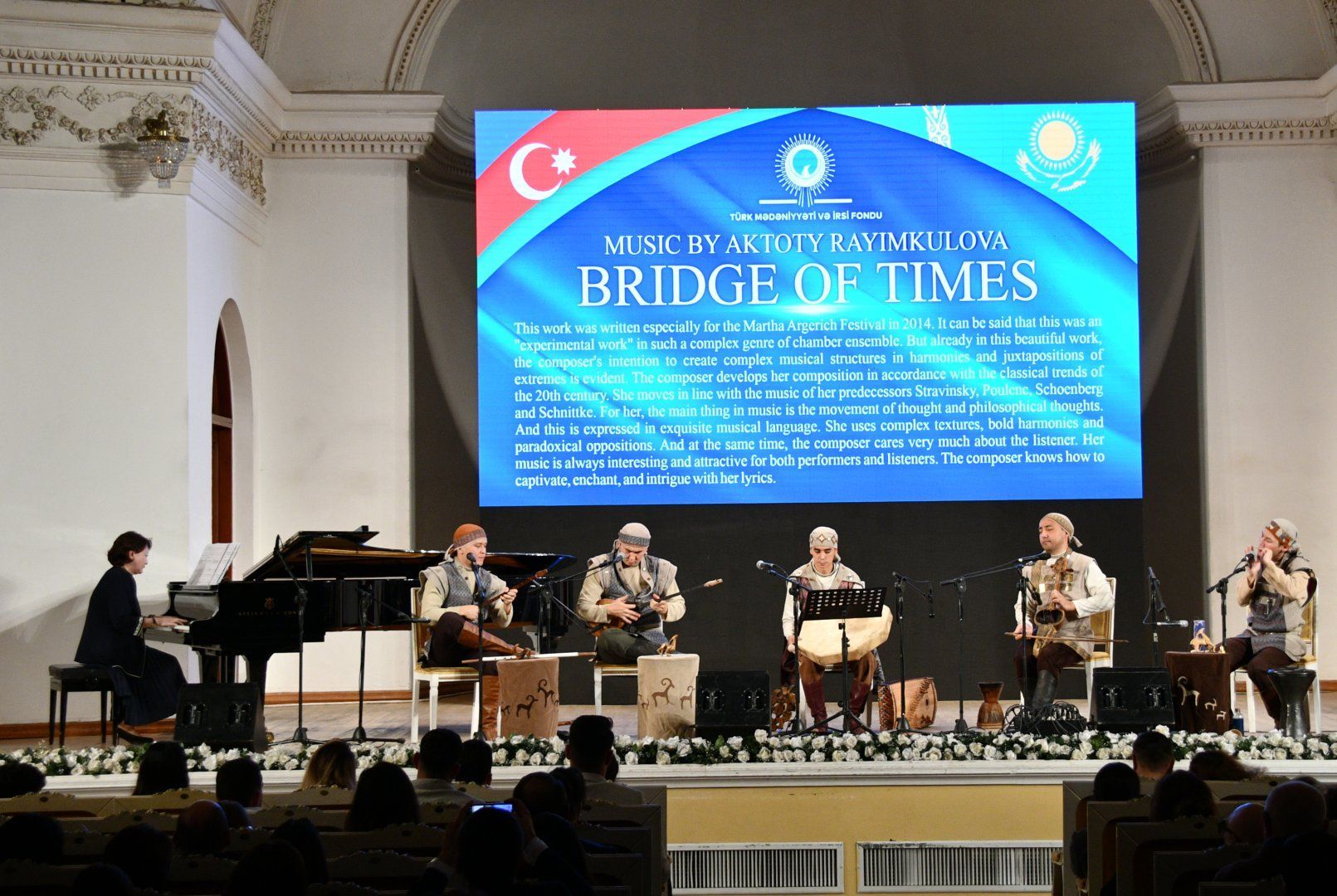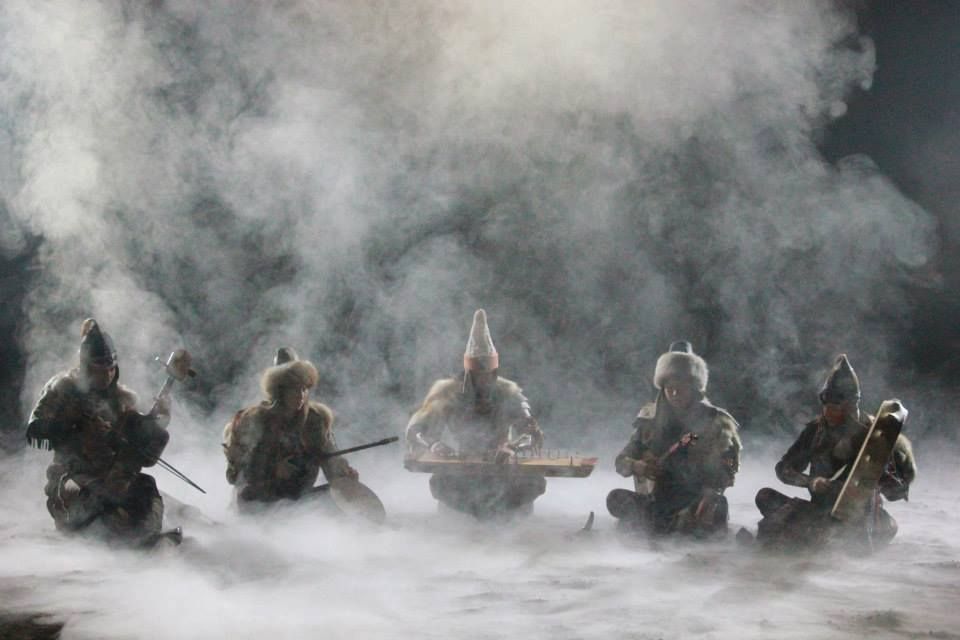|
|
TODAY.AZ / Arts & Entertainment
Turan Ethno-Folk Ensemble celebrates cultural legacy of Turkic world [EXCLUSIVE]
11 March 2024 [17:43] - TODAY.AZ

Fifteen years ago, a group of students from the Kazakh National Conservatory came together to create something truly special - the Turan ethno-folk ensemble.
Today, this ensemble stands as a vibrant example of the rich and vibrant Turkic music culture.
Comprised of five incredibly talented members, including Bauirzhan Bekmukhanbet, Serik Nurmoldaev, Maksat Medeubek, Zhantu Dadabayev and Erzhigit Aliyev, Turan ethno-folk ensemble showcases over 50 popular folk instruments such as the dombra, zhetygen, kobyz, sybyzgy, shorter, and shankobyz.

Since its foundation, the Turan ethno-folk ensemble has continued to impress and inspire music lovers around the globe.
As the ensemble celebrates its fifteenth anniversary this year, ensemble member Serik Nurmoldaev took the time to share his insights with Azernews, highlighting the power of Turkic folk music to unite people and keep alive the traditions of the past.
Q: Turan ethno-folk ensemble turns fifteen. What is the history behind the ensemble?
A: Turan ethno-folk ensemble is often referred to as an orchestra since we, as a full-fledged orchestra, play more than 50 musical instruments. Each ensemble member plays more than ten musical instruments. That's why we are called multi-instrumentalists. The Turan ethno-folk ensemble was formed in 2008 within the walls of the Kazakh National Conservatory, named after Kurmangazy. At that time, we were second year students. While still students, we were interested in the history of our people and their culture. From early childhood, we were instilled with a passion for folk music. In 2007, fate brought all five of us together. At that time, we gathered together to make musical improvisations. Subsequently, the ensemble's current works were created from these improvisations. All the compositions that you hear are original works created by five members of the Turan ethno-folk ensemble. These compositions were created while sitting at the dastarkhan (table), in the rehearsal rooms, when we simply loved to play and communicate through music.
The Turan ethno-folk ensemble celebrates its fifteenth anniversary this year. Over the past years, we have done major work and given over 3,000 solo concerts in more than 122 cities around the world. We have performed in renowned venues such as Carnegie Hall in New York, the John F. Kennedy Centre for the Performing Arts in Washington, and the Konzerthaus Berlin. We cannot help but be proud that folk music, the heritage of the Turkic World, is popular all over the world. Today the Turan ethno-folk ensemble is a musical brand of the Turkic World. We will continue to work in this vein and try to contribute even more to the development of our culture.
Q: The Turan ethno-folk ensemble has celebrated its anniversary with a large world tour, visiting a number of countries, including Azerbaijan. Could you please share your impressions of the concert held in Baku?
A: In 2023, we visited a lot of countries in honour of our anniversary. We went on a tour of the USA, Europe, and Asia. We also visited our brotherly Turkic countries, such as Turkiye and Azerbaijan. I would like to note that we love Azerbaijan very much, and this is not only about brotherly relations. Azerbaijan is a beautiful country that cannot but amaze with its picturesque nature, rich culture, wonderful music, and hospitable people. Members of the ensemble have repeatedly visited Azerbaijan, including cities such as Baku, Ganja, and Guba. In the future, we would really like to include Azerbaijan on a big tour.
Inspired by Azerbaijan, the Turan ethno-folk ensemble included in its repertoire several works and interpretations of Azerbaijani folk songs. We really hope that Azerbaijanis will like our musical interpretation. A video for an Azerbaijani folk song will be released very soon, and I think we will still be able to fully convey through music the atmosphere that we ourselves were inspired by in Azerbaijan.

Q: How did your musical style form?
A: The musical style of the Turan ensemble took a long time to form. As students, we listened to a lot of music. We were inspired by such luminaries as Khur Khuur Tu. Inspired by all this creativity and completely incorporating all the traditions of the Turkic fraternal peoples, we decided to create something unified. We are united, we are fraternal countries, and we have a single culture. It is very spiritually rich, so we decided that we should develop the culture of Great Turan, a large civilization that is the cradle for us. Therefore, this style was precisely formed thanks to the love, a lot of work, and knowledge that our teachers, our parents, nature itself, and our tours in different countries nurtured in us. We have a lot of friends from Azerbaijan. We love our fraternal countries very much and are ready to work to promote a common culture.
Q: In your opinion, is ethnic music popular today?
A: I can say with confidence that ethnic music is very popular today. Unfortunately, quite a few people now only strive for modern trends. Therefore, there is a huge need to search for identity, and this movement has begun to gain momentum at a tremendous pace now.
Each country, the Turkic people, honours its roots and traditions. And each country, in its own way, tries very hard to develop its culture, so this identity, namely folklore, ethnicity, is now very relevant in many countries.
At concerts, various people who are familiar with Turkic culture come up to us and thank us for developing our original traditions. There is also a second group of people who attend our concerts; these are those who were completely unfamiliar with this culture before our concerts. Listening to our music, they awaken a desire to understand the Turkic culture.
They say that Turkic music is cosmic. There is a lot of mysticism in it, and it represents a direct connection with our ancestors. This is sacred music that immediately makes a person understand who he is. Therefore, Turkic music is immortal, it is timeless and will be relevant at all times. Spectators who come to us say the following: "We don't understand the language, we don’t know anything about the Turkic culture, but we are left with a great impression after each of your performances. We have a desire to know ourselves."
As you can see, DNA memory, gene feelings, and the need to find your identity awaken.

Q: What musical projects are expected in the future?
A: In fact, the Turan ethno-folk ensemble has a lot of projects. On February 29, the ensemble launched a new project called TAMYR. In addition to the fact that Turan has already initiated the launch of many interesting projects on an experimental scale, we also organise lectures and concerts, which are now very relevant among the population. At these concerts, we don't just play music, we also brief the audience about centuries-old traditions, musical instruments and answer questions from the audience. The TAMYR project is kind of interactive. A person who comes to our concert not only listens, but also learns a lot and discovers Turkic culture in all its richness. This format was originally intended to last an hour and a half, but now viewers are asking to extend its duration by four hours. The last time we held a concert in this format, it lasted four hours.
The Turan ethno-folk ensemble also implemented the project together with the symphony orchestra. The project unites a folk ensemble of multi-instrumentalists and a symphony orchestra.
Symphonic poems and so on were written for us by composers from different countries, such as Tatarstan, Kazakhstan. The Turan ethno-folk ensemble has performed on the same stage with large symphony orchestras in the USA, Israel, and France. This interesting collaboration, which combines folk and symphonic music, gave impetus to the creation of such a project as Folk & Symphony, which is popular all over the world.
We also have another project called Bridge of Times. As part of this project, we also combined a chamber composition of classical music. In addition to the Turan ethno-folk ensemble, the project involves vocalists (soprano and tenor), a pianist, and a cellist.
Several works were composed in this composition. Together, we also revived the ancient Kypchak anthem. These are ancient records that were found during excavations of ancient cities.
Scientists deciphered the recording data, and we used these notes in our music. We present this project at our concerts.
Now we are launching the TAMYR project, which demonstrates the culture of all Turkic countries.
Thanks to the TAMYR project, we show the unity of all Turkic countries through their music and traditions. Our concert programs include works from many Turkic countries.
Thus, a person who comes to our concert gets to know his roots through folk music.
The word TAMYR itself has three meanings. First, it means brother, family ties between people from ancient Turkic. The root of the word TAMYR means tree. Without a root, a tree cannot exist and grow. It follows from this that we must focus on our roots, i.e., ancestry.
The Kazakhs have a word: 62 tamyr, that is, 62 veins. These veins connect all vital organs in the human body. By combining all these concepts, we bring a person closer to the understanding that we must be united. We must know our spiritual wealth, and only after that will we be able to develop spiritually and create something magnificent in culture and art. I truly believe that every person should rely on his ancestry. And only then he ?an evolve and flourish.
URL: http://www.today.az/news/entertainment/245858.html
 Print version
Print version
Connect with us. Get latest news and updates.
See Also
- 18 April 2025 [14:54]
Carpet Museum opens exhibition 'Second Life' - 18 April 2025 [12:03]
Shirvanshahs' Palace Complex displays over 60 calligraphic works - 18 April 2025 [11:02]
Azerbaijan to host Opera Days for first time - 17 April 2025 [15:19]
Int'l Mugham Center holds musical evening in honor of Shirulla Imanov - 17 April 2025 [13:00]
Reconstruction in Agdam, Khojavand, and Fuzuli follows five-stage plan: official - 17 April 2025 [12:02]
Webber Ndoro emphasizes key role of local communities in restoration projects - 16 April 2025 [13:36]
From screens to streets: TikTok brings Novruz traditions to global audience - 16 April 2025 [12:38]
Renowned mugham singer to meet with students - 16 April 2025 [11:42]
Philharmonic Hall holds magnificent concert in honor of Hajibayli dynasty - 16 April 2025 [10:39]
Ganja hosts info tour within "Preserve Cultural Heritage" project
Most Popular
 Separatists & Pashinyan - the farce continues
Separatists & Pashinyan - the farce continues
 4SIM signs MoUs with Chinese institutions to boost cooperation in green and industrial technologies
4SIM signs MoUs with Chinese institutions to boost cooperation in green and industrial technologies
 Antalya Diplomacy Forum becomes center of global dialogue
Antalya Diplomacy Forum becomes center of global dialogue
 A fat, nosy and bald hint that Armenia will remove claims against Azerbaijan from the Constitution
A fat, nosy and bald hint that Armenia will remove claims against Azerbaijan from the Constitution
 Collapse of "macaronism": Resignation of the "grey cardinal" of France may cause a chain reaction
Collapse of "macaronism": Resignation of the "grey cardinal" of France may cause a chain reaction
 Foreign diplomats tour liberated cities of Khankendi and Shusha
Foreign diplomats tour liberated cities of Khankendi and Shusha
 Paris hosts debut of Azerbaijan’s first AI art “Shusha”
Paris hosts debut of Azerbaijan’s first AI art “Shusha”
